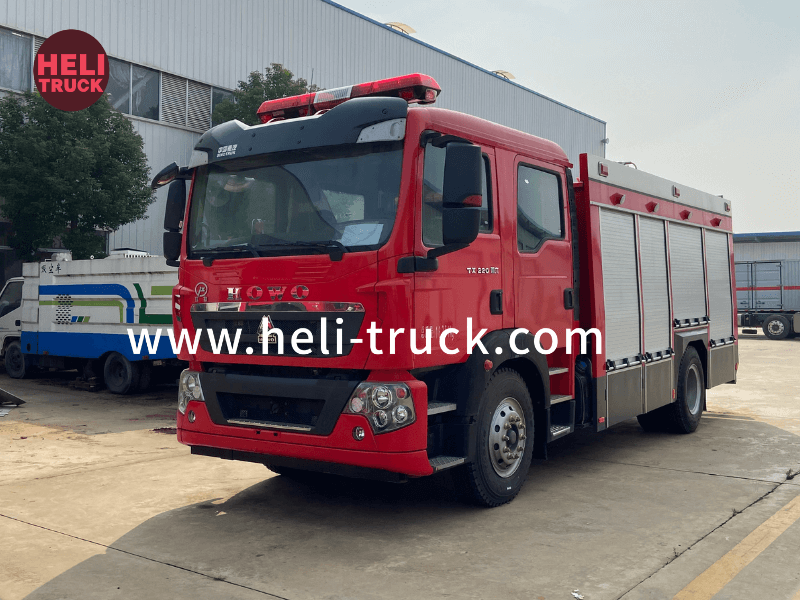Introduction
Work truck trailers play a crucial role in various industries, from transportation and logistics to construction and agriculture. These trailers are essential for carrying heavy loads and equipment, enabling businesses to efficiently transport goods and materials from one location to another. However, the fuel consumption of work truck trailers can have a significant impact on operational costs and environmental sustainability. In this article, we will explore the importance of work truck trailer fuel efficiency and discuss strategies to maximize fuel efficiency to reduce costs and minimize environmental impact.

Importance of Work Truck Trailer Fuel Efficiency
Fuel efficiency is a critical consideration for work truck trailers due to its direct impact on operational costs. The transportation industry heavily relies on diesel fuel to power heavy-duty vehicles, and fuel expenses can account for a significant portion of a company's overall operating expenses. By improving fuel efficiency, businesses can reduce their fuel consumption and lower their operational costs, leading to increased profitability and competitiveness in the market.
In addition to cost savings, maximizing work truck trailer fuel efficiency is also essential for reducing greenhouse gas emissions and minimizing environmental impact. Diesel fuel combustion releases carbon dioxide (CO2) and other pollutants into the atmosphere, contributing to air pollution and climate change. By improving fuel efficiency and reducing fuel consumption, businesses can lower their carbon footprint and contribute to a more sustainable and environmentally friendly future.
Factors Affecting Work Truck Trailer Fuel Efficiency
Several factors can influence the fuel efficiency of work truck trailers, including:
1. Aerodynamics: The shape and design of the trailer can have a significant impact on aerodynamic drag, which affects fuel consumption. Streamlined trailers with rounded corners and smooth surfaces experience less air resistance, leading to improved fuel efficiency.
2. Weight: The weight of the trailer and its cargo can impact fuel efficiency, as heavier loads require more fuel to transport. By optimizing the load capacity and distribution, businesses can reduce fuel consumption and improve efficiency.
3. Tire pressure: Proper tire inflation is crucial for maximizing fuel efficiency, as underinflated tires can increase rolling resistance and fuel consumption. Regularly checking and maintaining optimal tire pressure can help businesses save on fuel costs.
4. Driving behavior: Driver behavior, such as speeding, aggressive acceleration, and idling, can significantly affect fuel efficiency. Encouraging drivers to adopt fuel-efficient driving habits can help businesses reduce fuel consumption and improve overall efficiency.
5. Maintenance: Regular maintenance and servicing of work truck trailers are essential for optimal performance and fuel efficiency. Properly maintained engines, brakes, and other components can operate more efficiently and consume less fuel.
Strategies to Maximize Work Truck Trailer Fuel Efficiency
To improve fuel efficiency and reduce operating costs, businesses can implement various strategies to optimize the performance of their work truck trailers. Some effective strategies include:
1. Aerodynamic enhancements: Investing in aerodynamic enhancements, such as trailer skirts, boat tails, and side fairings, can help reduce aerodynamic drag and improve fuel efficiency. These modifications can streamline airflow around the trailer, reducing fuel consumption at highway speeds.
2. Lightweight materials: Using lightweight materials in trailer construction can help reduce overall weight and improve fuel efficiency. Aluminum and composite materials are lighter than traditional steel, offering fuel savings without compromising strength and durability.
3. Route optimization: Planning efficient routes and minimizing unnecessary stops and detours can help reduce fuel consumption and improve overall efficiency. Utilizing GPS technology and route optimization software can help businesses identify the most fuel-efficient routes for their work truck trailers.
4. Idle reduction technology: Installing idle reduction technology, such as automatic engine shut-off systems and auxiliary power units, can help minimize fuel consumption during idle periods. By reducing unnecessary idling, businesses can save on fuel costs and reduce emissions.
5. important site : Providing drivers with training on fuel-efficient driving techniques, such as smooth acceleration and braking, maintaining steady speeds, and avoiding excessive idling, can help improve fuel efficiency. Educating drivers on the importance of fuel conservation can lead to significant fuel savings over time.
6. Tire management: Implementing a comprehensive tire management program, including regular tire inspections, proper inflation, rotation, and alignment, can help maximize fuel efficiency. Well-maintained tires with optimal pressure levels can reduce rolling resistance and improve overall performance.
7. Maintenance schedule: Establishing a proactive maintenance schedule for work truck trailers is essential for ensuring optimal performance and fuel efficiency. Regular inspections, tune-ups, and repairs can prevent mechanical issues that may affect fuel consumption and operational efficiency.
8. Telematics technology: Utilizing telematics systems and onboard vehicle monitoring devices can help businesses track fuel consumption, monitor driver behavior, and identify opportunities for improving fuel efficiency. Real-time data and analytics can inform decision-making and drive continuous improvement efforts.
Conclusion
Maximizing work truck trailer fuel efficiency is crucial for reducing operating costs, minimizing environmental impact, and promoting sustainability in the transportation industry. By implementing strategies to improve aerodynamics, reduce weight, optimize routes, train drivers, manage tires, maintain vehicles, and utilize technology, businesses can enhance fuel efficiency and achieve significant cost savings over time. Investing in fuel-efficient practices not only benefits the bottom line but also contributes to a greener future by reducing carbon emissions and promoting environmental stewardship. By prioritizing fuel efficiency in work truck trailer operations, businesses can drive positive change and lead the way towards a more sustainable and efficient transportation sector.
